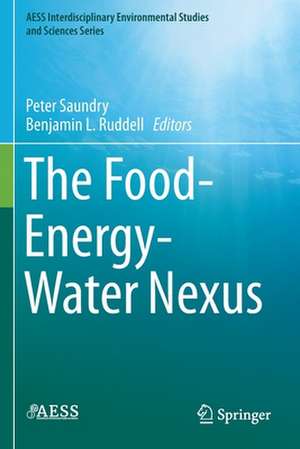The Food-Energy-Water Nexus: AESS Interdisciplinary Environmental Studies and Sciences Series
Editat de Peter Saundry, Benjamin L. Ruddellen Limba Engleză Paperback – 26 aug 2021
This textbook provides a substantive introduction to the food-energy-water nexus suitable for use in higher level undergraduate and graduate level courses and for scholars moving into the field of nexus studies without a strong background in all three areas and the many aspects of nexus studies.
| Toate formatele și edițiile | Preț | Express |
|---|---|---|
| Paperback (1) | 478.04 lei 6-8 săpt. | |
| Springer International Publishing – 26 aug 2021 | 478.04 lei 6-8 săpt. | |
| Hardback (1) | 610.61 lei 6-8 săpt. | |
| Springer International Publishing – 7 apr 2020 | 610.61 lei 6-8 săpt. |
Preț: 478.04 lei
Nou
Puncte Express: 717
Preț estimativ în valută:
91.48€ • 97.82$ • 76.27£
91.48€ • 97.82$ • 76.27£
Carte tipărită la comandă
Livrare economică 17 aprilie-01 mai
Preluare comenzi: 021 569.72.76
Specificații
ISBN-13: 9783030299163
ISBN-10: 3030299163
Pagini: 688
Ilustrații: XVI, 688 p. 102 illus., 68 illus. in color.
Dimensiuni: 155 x 235 mm
Greutate: 0.97 kg
Ediția:1st ed. 2020
Editura: Springer International Publishing
Colecția Springer
Seria AESS Interdisciplinary Environmental Studies and Sciences Series
Locul publicării:Cham, Switzerland
ISBN-10: 3030299163
Pagini: 688
Ilustrații: XVI, 688 p. 102 illus., 68 illus. in color.
Dimensiuni: 155 x 235 mm
Greutate: 0.97 kg
Ediția:1st ed. 2020
Editura: Springer International Publishing
Colecția Springer
Seria AESS Interdisciplinary Environmental Studies and Sciences Series
Locul publicării:Cham, Switzerland
Cuprins
Part1: Framing the Nexus.- Chapter1. Introduction.- Chapter2. Demographics, Supply, Demand and Sustainable Development Goals.- Chapter3. Ecosystems at the Nexus.- Chapter4. Infrastructure.- Chapter5. Climate.- Chapter6. Economics.- Part2: Scientific Tools at the Nexus.- Chapter7. Questions and Scales.- Chapter8. Metrics.- Chapter9. Data.- Chapter10. Modeling.- Chapter11. Computing.- Chapter12. Questions and Scales revisited.- Part3: Human dimensions.- Chapter13. Human Behavior and Adaptation.- Chapter14. Conflict, Mediation, and Dispute Resolution.- Chapter15. Global and International Policy and Law.- Chapter16. U.S. Policy and Law.- Part4: Two Approaches to the Nexus.- Chapter17. Cities.- Chapter18. Watersheds.
Notă biografică
Peter Saundry is an Adjunct Professor of Energy at Johns Hopkins University and Senior Fellow at the National Council for Science and Environment where he was Executive Director (1993-2016). He is also a consultant on science and policy integration, energy and climate policy development, and federal funding for energy and climate research and development. His PhD is in Physics from the University of Southern California, and was an American Physical Society Congressional Science Fellow for the Appropriations Committee of the U.S. Senate.
Ben Ruddell is currently a Professor in and the Director of the School of Informatics, Computing, and Cyber Systems at Northern Arizona University, the President of Ruddell Environmental consulting, Chief Science Officer for Criticality Sciences Inc., and the Director of the FEWSION project. His PhD is in Civil and Environmental Engineering from the University of Illinois at Urbana-Champaign. He is a registered Professional Engineer in Arizona (Water Resources practice). His professional goals are the advancement of the science and management of complex systems, and excellence in education in a university setting.
Ben Ruddell is currently a Professor in and the Director of the School of Informatics, Computing, and Cyber Systems at Northern Arizona University, the President of Ruddell Environmental consulting, Chief Science Officer for Criticality Sciences Inc., and the Director of the FEWSION project. His PhD is in Civil and Environmental Engineering from the University of Illinois at Urbana-Champaign. He is a registered Professional Engineer in Arizona (Water Resources practice). His professional goals are the advancement of the science and management of complex systems, and excellence in education in a university setting.
Textul de pe ultima copertă
This book provides a substantive integrated introduction to the food-energy-water nexus suitable for use in higher level undergraduate and graduate level courses and for scholars moving into the field of nexus studies without a strong background in all three areas and the many aspects of nexus studies. The book will include little or no mathematical equations. The book’s references/bibliography is a significant resource to those initiating deeper studies.
In recent years, the world has seen a dramatic rise in interdisciplinary energy and environmental courses and degrees at the undergraduate and graduate levels. In the US for instance, the number and variety of such programs has increased significantly over the past decade.
Caracteristici
Provides interdisciplinary treatment to the Food-Energy-Water (FEW) Nexus complex influence on social ecological systems Presents examples, case studies and tools including modeling and computing Provides introduction for environmental studies students









